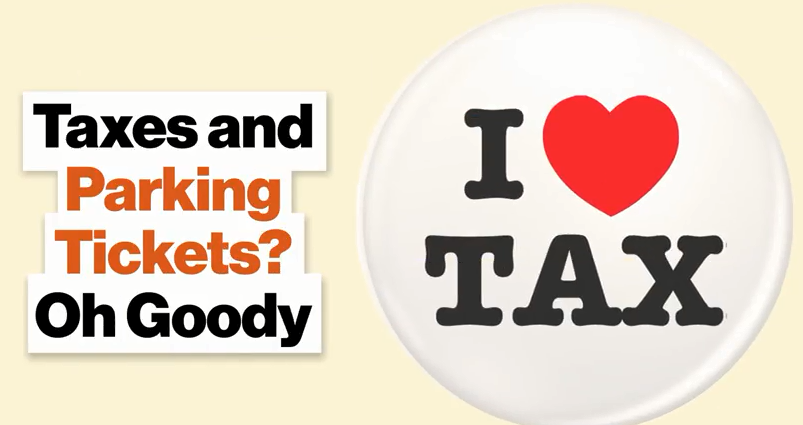(单词翻译:单击)
When we started studying people paying their taxes we were kind of looking for a real pain point that people have.
我们研究人们交税时,基本就是在研究人们真正的痛点
If you think about what’s the worst day of the year for you, often the worst day of the year is when you have to write that extra check to the IRS.
想想一年中最讨厌的日子,通常都是你给美国国税局(IRS)一张额外支票的那一天
And of course partly we hate it just because we have to give money away that we wish we could keep,
我们之所以讨厌它,部分是因为我们必须得把想自己留着的钱给别人
but we thought there might be some other underlying psychology going on for why we hate paying taxes so much.
但我们觉得人们之所以如此讨厌交税,可能还有一些其他深层次的心理因素
And if you think about it when you send that check off you kind of have no idea what happens with it.
想想你每次寄出那张支票时,你根本不知道它会去哪里
I mean you know it’s going to your state or federal government, but you don’t really know what it’s being used for.
我是说你知道它会到国家或者联邦政府那里去,但你并不知道它会被用来干什么
You look outside and you see roads and there’s some link between those in some way or another but you don’t really know exactly what’s happening.
看一眼外面,有很多路,路与路之间有某些关系,但你并不清楚到底是怎么回事
And that decoupling between what you’re sending in and what the output is is actually pretty aversive for us,
而寄支票和结果之间的耦合关系让我们相当反感
we kind of like to know when we do something what’s going to happen as a result.
我们做某件事时还是希望知道它的结果是什么
And so what we try to do in our research is recouple those two things closer together.
所以我们在研究中试图让这两件事产生更紧密的联系

So imagine, for example, when you pay your taxes you write in the amount and then you can allocate where you want things to go.
想象一下,比如,你在交税时写下一定的金额,并把它们分配到你希望分配的事情上去
You could actually say I want more of my taxes to go to schools versus roads versus the military or the reverse if you wanted to support the military more.
你可以说我想让我更多的税款用在学校上而不是道路或者军事上,或者反之亦然——如果你想更多支持军事的话
And the idea there was sure we still wouldn’t like paying taxes that much because we wish we could spend our money on ourselves,
当然,我们还是不想交那么多税,因为我们希望把自己的钱花在自己身上
but recoupling the cost and the benefits might actually help us hate it a little bit less.
但是把开支和收益结合起来可能会让我们不再对交税恨之入骨
We’ve talked to a lot of governments, local governments, state governments, federal governments in the U.S. and around the world
我们与美国的地方政府、州政府、联邦政府和世界上的很多政府谈过
about implementing this idea of recoupling tax payments with the benefits that citizens get.
把纳税和市民所得到的好处联系起来
Politically it’s quite difficult, so you can imagine that if you talk about letting citizens allocate all of their money wherever they want
从政治上来讲, 这相当困难,试想一下,如果你让市民把他们的钱分配在自己想花的地方
you might not get funding for really basic things like infrastructure that aren’t really that exciting for people to think about.
那么像基础设施这种不那么让人兴奋的基本领域就筹不到足够的基金了
So politically there’s a real risk to kind of opening up democracy where instead of taxes going into a pool where elected officials decide what needs to be done, each individual citizen has a voice.
所以从政治上讲,每位市民都可以自由选择,而不是把所有税款集中到一起,由当选官员来决定做什么的开放民主是有真实风险的
One way we’ve tried to deal with that is to think about maybe you don’t need to allocate 100 percent of your taxes wherever you want,
我们想过一种办法来解决这个问题,就是不必让人们自由分配他们所有的税款
but what if I said at the end of the year you know what, you’re going to get to allocate ten percent wherever you want.
而是到年底的时候,你可以把10%的税款自由分配在你想花费的方面
So most of your taxes are still going to be the old way where they go into a general pool and then the people we’ve elected who we in theory trust
那么多数钱还是会按老样子集中到一起,由我们选举出来的、理论上信任的人
will decide where the money goes, but we still as citizens get to say a little bit more about what we want to do.
来决定怎么用这些钱,但是作为市民,我们还是有权发表一下自己的意见
And some cities in the United States have started doing this through something called participatory budgeting.
美国的一些城市已经开始这么做了,他们采取了一种叫做参与式预算的政策
And the idea there is that a city can take some tax money, it could be a small amount, it could be a large amount,
城市可以拿出一些税款,可以是一小笔也可以是一大笔
the city of Cambridge where I live has done this, and let citizens vote for where that money should go.
我所生活的剑桥市就这么做了,让市民投票决定他们想把钱花在哪里
So they’re not getting access to all of the tax revenue for the entire city,
这样他们就不能掌控整座城市的所有税收
but the city is saying we want to set aside some money where citizens can actually tell us where it should go
而是由城市决定拿出一部分钱来花在市民想花的地方
and we will follow through and make sure the money goes there.
我们会跟踪这笔钱,确保它确实花在了该花的地方
And again, that helps citizens see that, it’s called participatory budgeting, they’re actually participating and getting to make specific decisions about what happens with their taxes.
这叫做参与式预算,它能让市民看到自己参与了进来,亲自决定他们的税款应花在什么地方
One of the things that w'eve thought about are that taxes are big.
我们考虑过的一点是税收很庞大
So if you think about changing the entire tax system that can be politically difficult.
所以如果你想改变整个税制,这从政治上来说很困难
It sort of changes the nature of the relationship between our money and the federal government.
它会改变我们的钱与联邦政府之间的关系的本质
But you can think about smaller sort of initiatives where it's not the entire tax revenue of an entire city or a country,
但如果你想想更细小的方面,而不是整座城市或整个国家的所有税款
but you can imagine my colleague Kate Lamberton at Pittsburgh, has shown for example that you can allocate your parking fines.
比如我在匹兹堡的同事凯特·兰博顿所说的那样,你可以分配你的停车罚款
Where you get a ticket on your car and you're furious because of course you've parked in the right place and it's unjust that you get a ticket...
你收到车辆罚单时会很生气,因为你肯定是停对了地方啊,收到罚单真是太不公平了...
what if even just on that parking ticket it could be twenty five or fifty dollars -
如果那张停车罚单,可能是25美元或15美元
even there you might be able to say just a little bit on the margin I'd like the fee to go to this in my city instead of that in my city.
即便是这么少的钱,你也可以稍微发表一下自己的意见,你想让这点钱花在城市的这一方面而不是那一方面
Now you're not changing the whole political system of taxation, but you're still changing the relationship between citizens and government on a real pain point
这样你就不会改变整个税收的政治体系,但你还是在一个真正的痛点上改变了市民与政府之间的关系
which is of course you're paying fines and fees that you've incurred,
当然这个痛点就是指你付了自己招致的罚款和费用
but I can now tell the city yeah it's true that I parked in the wrong place and will now pay you
但现在我可以告诉这座城市“嗯,没错,我停错地方了,我交给你罚款
but I'll give you a little voice in where that money goes and I might feel a little bit better in now paying that.
但我想自己决定一下这些钱要花在哪里,这样我给你钱心里也会舒服一些”


